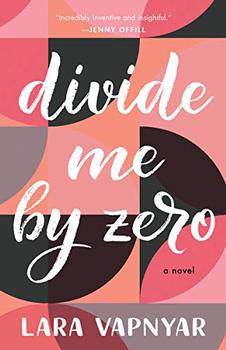Summary | Excerpt | Reviews | Beyond the Book | Readalikes | Genres & Themes | Author Bio

Excerpt
Divide me by zero
One week before my mother died, I went to a Russian food store on Staten Island to buy caviar. I was brought up in the Soviet Union, where caviar was considered a special food reserved for children and dying parents. I never thought of it as extravagant or a romantic delicacy. My mother would offer me some before important tests in school, because it was chock-full of phosphorus that supposedly stimulated brain cells. I remember eating caviar before school, at seven am, still in my pajamas, shivering from the morning cold, seated in the untidy kitchen of our Moscow apartment, yawning and dangling my legs, bumping my knees against the boards of our folding table, holding that piece of bread spread with a thin layer of butter and thinner layer of caviar.
I did eat caviar in a romantic setting once. With a very rich Russian man who I agreed to marry even though I was still married to Len and still in love with B.
"Caviar," I said to the sullen Russian woman behind the fish counter, and pointed to the smallest plastic container. She had blonde bangs pushing from under her white cap, uneven skin, thin lips with the remains of the morning's lipstick in the creases. Most probably she was a recent immigrant who had had to leave her family in Ukraine or Moldova and come work here so she could send them money. I imagined how much she must hate her well-to-do customers, wearing leather and gold, choosing their gleaming cuts of smoked salmon, pointing to the sushi rolls, ordering caviar.
She regarded me with wary puzzlement. I was dressed in sweatpants and a T-shirt I hadn't changed in days, and didn't look well-to-do or well.
She squinted at me, spooned the caviar into the container, and put it on the scale.
"It's for my mother," I said.
I don't understand what compelled me to share this. I'm a private person. I don't chat with strangers. I don't share things. Except, of course, in my fiction.
But I said that to the woman behind the fish counter. I wasn't sure if she heard me. There was loud music playing through the speakers, alternating with advertisements. "Buy your kitchen sink from Alex's Stainless."
The muscles around my mouth started to twitch, and I wanted them to stop, but I didn't have any control over them.
The woman behind the counter did hear me. And she understood what I meant right away. She stood there as if frozen, holding that container with caviar in her hands.
I think she was the one who started to cry first. Then I started to cry. Or it could've been that I was crying the whole time.
The woman behind the counter seemed to be as shocked by her tears as I was. I was ashamed. I didn't have the right to pull her into my grief. I used her. The silent anguish was getting impossible to take—I needed an explosive release, and I used that woman to help me explode. Or perhaps, I needed a tiny bit of kindness, of connection, right there, right at that moment, in front of the fish counter with those gleaming cuts of smoked salmon, and colorful sushi rolls, and caviar.
Then I saw she wasn't crying for me, or for my mother, but that something about my experience momentarily clicked with hers. I became exposed to her, and she became exposed to me. And perhaps she needed it as much as I did.
I think about that woman often.
My mother didn't want the caviar. I waited until she woke up, and then I made her a sandwich that looked exactly like the ones she had made for me before school. She studied it and raised her eyes to me. She still recognized me as a caretaker or as some sort of parental figure, but I don't think she knew who I was anymore. She looked at me with that pleading expression she had had for the last week or two, as if she knew that I wanted something from her, and she would've been happy to oblige, but could I please, please, please leave her alone?
From Divide Me By Zero by Lara Vapnyar. Used with the permission of the publisher, Tin House Books. Copyright © 2019 by Lara Vapnyar.
Knowledge is of two kinds. We know a subject ourselves, or we know where we can find information on it.
Click Here to find out who said this, as well as discovering other famous literary quotes!
Your guide toexceptional books
BookBrowse seeks out and recommends the best in contemporary fiction and nonfiction—books that not only engage and entertain but also deepen our understanding of ourselves and the world around us.